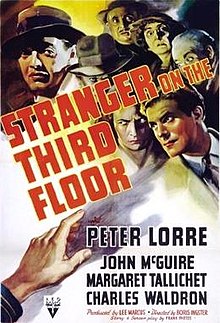Stranger on the Third Floor
| Stranger on the Third Floor | |
|---|---|

Theatrical release poster
|
|
| Directed by | Boris Ingster |
| Produced by | Lee S. Marcus |
| Written by | |
| Starring | |
| Music by | Roy Webb |
| Cinematography | Nicholas Musuraca |
| Edited by | Harry Marker |
| Distributed by | RKO Pictures |
|
Release date
|
|
|
Running time
|
64 minutes |
| Country | United States |
| Language | English |
| Budget | $171,200 (estimated) |
Stranger on the Third Floor is a 1940 film noir, starring Peter Lorre and released by RKO Radio Pictures. The film was directed by Boris Ingster and written by Frank Partos with Nathanael West (uncredited).
Stranger on the Third Floor is often cited as the first "true" film noir of the classic period (1940–1959), though other films that fit the genre such as Rebecca and They Drive by Night were released earlier. Nonetheless, it has many of the hallmarks of film noir: an urban setting, heavy shadows, diagonal lines, voice-over narration, a dream sequence, low camera angles shooting up multi-story staircases, and an innocent protagonist falsely accused of a crime who is desperate to clear himself.
Reporter Michael Ward is the key witness in a murder trial. His evidence – that he saw the accused Briggs standing over the body of a man in a diner – is instrumental in having Briggs found guilty.
Afterwards Ward's fiancee Jane is worried whether Ward was correct in what he saw and Ward becomes haunted by this question. Next, Ward's neighbor is killed the same way as the man in the diner, but Ward is arrested for trying to point this out to the police. As a result, Jane goes out to try to clear Ward by finding the sinister stranger that Ward saw on the stairwell.
Upon its release in 1940, The New York Times film critic, Bosley Crowther, called the film pretentious and derivative of French and Russian films, and wrote, "John McGuire and Margaret Tallichet, as the reporter and his girl, are permitted to act half-way normal, it is true. But in every other respect, including Peter Lorre's brief role as the whack, it is utterly wild. The notion seems to have been that the way to put a psychological melodrama across is to pile on the sound effects and trick up the photography."
The staff at Variety also believed the film was derivative, and wrote, "The familiar artifice of placing the scribe in parallel plight, with the newspaperman arrested for two slayings and only clearing himself because of his sweetheart's persistent search for the real slayer, is used ... Boris Ingster's direction is too studied and when original, lacks the flair to hold attention. It's a film too arty for average audiences, and too humdrum for others."
...
Wikipedia
